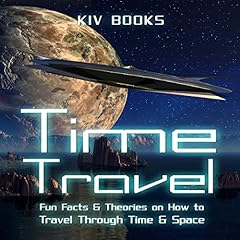
Time Travel
A History
Failed to add items
Sorry, we are unable to add the item because your shopping cart is already at capacity.
Add to Cart failed.
Please try again later
Add to Wish List failed.
Please try again later
Remove from wishlist failed.
Please try again later
Adding to library failed
Please try again
Follow podcast failed
Please try again
Unfollow podcast failed
Please try again
 Prime members: New to Audible?
Prime members: New to Audible?Get 2 free audiobooks during trial.
Pick 1 audiobook a month from our unmatched collection.
Unlimited access to our all-you-can listen catalog of 150K+ audiobooks and podcasts.
Access exclusive sales and deals.
Premium Plus auto-renews for $14.95/mo after 30 days. Cancel anytime.
Buy for $22.50
-
Narrated by:
-
Rob Shapiro
-
By:
-
James Gleick
“A bracing swim in the waters of science, technology and fiction.” —Washington Post
“A thrilling journey of ideas.” —Boston Globe
From the acclaimed author of The Information and Chaos, here is a mind-bending exploration of time travel: its subversive origins, its evolution in literature and science, and its influence on our understanding of time itself.
The story begins at the turn of the previous century, with the young H. G. Wells writing and rewriting the fantastic tale that became his first book and an international sensation: The Time Machine. It was an era when a host of forces was converging to transmute the human understanding of time, some philosophical and some technological: the electric telegraph, the steam railroad, the discovery of buried civilizations, and the perfection of clocks. James Gleick tracks the evolution of time travel as an idea that becomes part of contemporary culture—from Marcel Proust to Doctor Who, from Jorge Luis Borges to Woody Allen. He investigates the inevitable looping paradoxes and examines the porous boundary between pulp fiction and modern physics. Finally, he delves into a temporal shift that is unsettling our own moment: the instantaneous wired world, with its all-consuming present and vanishing future.
(With a color frontispiece and black-and-white illustrations throughout)
Listeners also enjoyed...




















People who viewed this also viewed...












I just don’t know what the point of the book was. And that’s too bad because I really wanted to like it.
Cluttered and Unfocused
Something went wrong. Please try again in a few minutes.
Time Traveling
Something went wrong. Please try again in a few minutes.
Interesting !
Something went wrong. Please try again in a few minutes.
Not great
Something went wrong. Please try again in a few minutes.
a great read very interesting good narrator
Something went wrong. Please try again in a few minutes.


